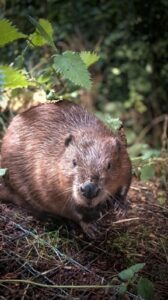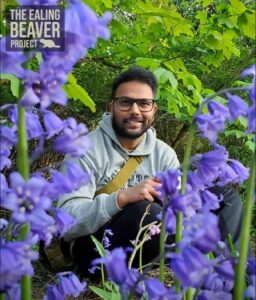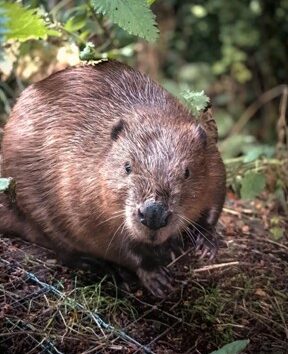Autumn 2023 saw the exciting return of beavers to England’s capital city, with the release of five animals in an 8ha enclosure at Paradise Fields, Ealing. Here, Dr Abhilesh Dhawanjewar, Technology Lead for the Ealing Beaver Project, shares an account of this community rewilding project, from its conception and achievements so far to hopes for the future of the Ealing beavers.
Bringing the Beaver Back to Ealing: A Community-Led Rewilding Success Story
Eurasian Beavers (Castor fiber), Europe’s largest rodent are incredible creatures with an amazing ability to transform their surroundings, lending them the well-deserved title of ‘ecosystem engineers’. Occupying vast regions across Europe and northern Asia for over 12 million years, they have shaped our waterways and wetland habitats, creating rich and resilient ecosystems supporting a wide diversity of plants and animals. Commercial demand for their fur, meat and castoreum led to relentless hunting and persecution of the beavers, driving them to extinction in the UK 400 years ago. The species narrowly avoided the same fate across Europe, its survival hinging on just eight relict populations that totalled a mere 1200 individuals. Their absence from the UK has coincided with a 90% reduction in Britain’s native wetlands in the last century and increased flood and drought risks. Having realised their ecological benefits, beaver reintroductions across Europe have helped to restore habitats and boost biodiversity. Reintroduction projects in the UK gaining momentum lately.

The Road to Ealing
As the UK government refined its reintroduction strategy, free-living beavers were already on London’s doorstep, with populations expanding in Kent and Oxfordshire. Anticipating their natural return, the London Beaver Working Group was formed in 2021 to proactively manage their arrival. After consultations and site visits, Paradise Fields in Ealing was chosen as an ideal location for a trial reintroduction. The site was already targeted for expensive flood mitigation engineering works, and beavers presented a natural, cost-effective alternative. After a license was granted in January 2023, the project gained momentum, fuelled by enthusiastic local volunteer groups and vital seed funding from Ealing Council and the Mayor of London. Thanks to the collaborative efforts of Ealing Wildlife Group, Citizen Zoo, Friends of Horsenden and Ealing Council with additional support from Beaver Trust, the Ealing Beaver Project was born with three key objectives:
- Bring back the Beaver: Reintroduce beavers for their intrinsic value in nature
- Mitigate urban flooding: Learn to manage beavers in the urban context and harness their water-engineering skills
- Boost Biodiversity: Restore wetland habitat and encourage a richer diversity of flora and fauna
- Public Engagement: Foster greater public understanding and coexistence with beavers in an urban setting
What sets the Ealing Beaver Project apart from other similar initiatives is its community-driven and inclusive approach to urban rewilding. While most beaver reintroduction projects in the UK are tucked away in the remote countryside or on vast private estates with paid access and closing times, the Ealing Beaver Project is one of the first fully accessible enclosed beaver reintroduction sites in the UK, offering a rare opportunity for the public to observe and engage with beavers in a city environment. At the same time, it allows local communities to directly benefit from the ecological improvements that beavers bring, such as improved biodiversity, better water management, and revitalised natural spaces.
Progress so far
A family of five Eurasian beavers was introduced to Paradise Fields in Greenford, Ealing on 11th October 2023 and since then, the Ealing Beaver Project has become a flagship example of urban rewilding in London. Within days of their arrival, the beavers had already started shaping their new home, building dams, creating new waterways and pools and kickstarting the transformation of the site into a thriving wetland. To date, they have constructed seven dams across the site, holding more water on the landscape and minimising the flooding downstream during high rainfall events. Their activities have also opened up the overshaded tree canopy, creating a mosaic of habitats supporting greater biodiversity.

Early results from monitoring and ecological surveys are promising: water quality sampling has shown a reduction in nutrient levels such as phosphates and nitrates, as well as total dissolved solids including pollutants and road runoff particulates, in water leaving the site compared to that entering it. Since the beavers’ arrival, the return of several species has also been recorded at Paradise Fields. Invertebrate populations have increased, especially water quality sensitive species such as freshwater shrimp, diving beetles and caddisfly larvae, which in turn has attracted two new species of bats and four new species of birds, early signs of a flourishing, interconnected system. The biodiversity benefits also extend to amphibians with an explosion in Common Frog spawning on site, thanks to the beavers’ ecosystem engineering activities.
Perhaps the most promising sign that the beavers have truly settled into their home came in the summer of 2024, when at least two new kits were born. This historical moment marked the first record of breeding beavers in urban London in centuries. While beavers went extinct in the UK 400 years ago, they likely vanished from London’s waterways even earlier. The fact that beavers were commonplace in London is preserved in the legacy they left in names like the Beverly Brook, a small river in Southwest London whose name is thought to derive from “beaver stream”. It’s the ultimate validation that the urban habitat at Paradise Fields is a suitable habitat, and that beavers and people can successfully coexist in a bustling urban landscape.

On the community engagement front, interpretative signage has been installed on the site to help visitors learn more about beaver adaptations and ecology and visitors are encouraged to log their wildlife sightings on platforms like iNaturalist, further promoting citizen science data collection. The hugely popular Guided Walks and Beaver Safaris led by members of the Ealing Beaver Project team have welcomed hundreds of visitors, offering a first-hand look at this rewilding success story. In a borough-wide naming competition, primary school pupils chose names for four of the resident beavers: “Willow” and “Woody” for the original pair introduced in 2023, and “Chompy” and “Chewbacca (Chewy)” for the kits born in 2024.
The Ealing Beaver Project leadership team also shared their urban rewilding model at the international BeaverCon conference in Colorado, and participated in knowledge exchange panel discussions and workshops. The story of the project has also been beautifully documented in the award-winning short film “Beavers in Paradise” by filmmaker Matt Brierley and commissioned by Consano Earth, which premiered to an international audience for the first time at BeaverCon. Drawing from insights gained from the conference, a pond levelling device was recently installed on-site to demonstrate how water levels can be proactively managed. The project has recently attracted significant support, including a recent grant from the HS2 Community and Environment Fund, which will be vital for enhancing public education and engagement for years to come.

What’s Next for the Ealing Beavers?
The project’s remarkable success has provided a powerful validation of the urban rewilding approach. As it moves towards the halfway point of its five-year license, the key priorities are
- The continued monitoring of this evolving landscape.
- Documenting the water quality and biodiversity improvements in the area.
- Helping to design mitigation strategies that balance beaver activity with the needs of local communities and neighbouring infrastructure.
Public engagement lies at the heart of the project and this will only deepen in the years to come. The revitalisation of this urban green space, right next to a busy retail park, has fundamentally improved how visitors interact with nature. The fully publicly accessible site serves as a vital outdoor classroom, where visitors can witness the dynamism of a beaver engineered landscape first-hand. Fuelled by the recent support, plans are underway to expand educational programs for local schools and the public, demonstrating how people and wildlife can live alongside and benefit from each other in our cities.
The project team is exploring options to trap the eldest daughter, born in 2022 and introduced to Paradise Fields in 2023 for translocation to other suitable beaver projects, helping support the national effort to restore this keystone species. With the recent announcement from the UK government regarding licensing the wild release of beavers, the team is also exploring how this pilot could inform the reintroduction of free-living beavers in Greater London. While Paradise Fields remains an enclosed trial, the project has contributed valuable insights into coexistence, site suitability, and the infrastructural tweaks needed to support beavers in England in the long-term. The hope is that future generations of kits from the Paradise Fields family will be able to roam freely, improving the health of England’s river systems and wetlands.

Perhaps the most anticipated next step is one that the beavers’ meticulous activities have been preparing the site for all along: the reintroduction of water voles. Water voles are Britain’s fastest declining mammal, having lost 90% of their population since the 1970s, due to habitat degradation and fragmentation along with overshading of riparian habitat. Restoring habitats and improving our aquatic ecosystems are a necessary step towards supporting water vole populations and with the beavers’ help, we can improve the health of our wetlands making them more resilient and providing valuable habitat for other vulnerable species.
The Ealing Beaver Project is a testament to the conviction and power of community-led conservation, the profound effectiveness of nature-based solutions to urban problems and the inspiring possibility of welcoming wildlife back into our cities for the benefit of both people and nature.
Author – Abhilesh Dhawanjewar


